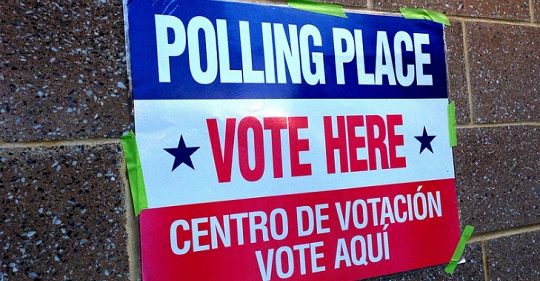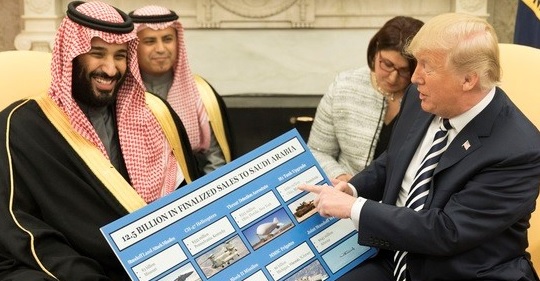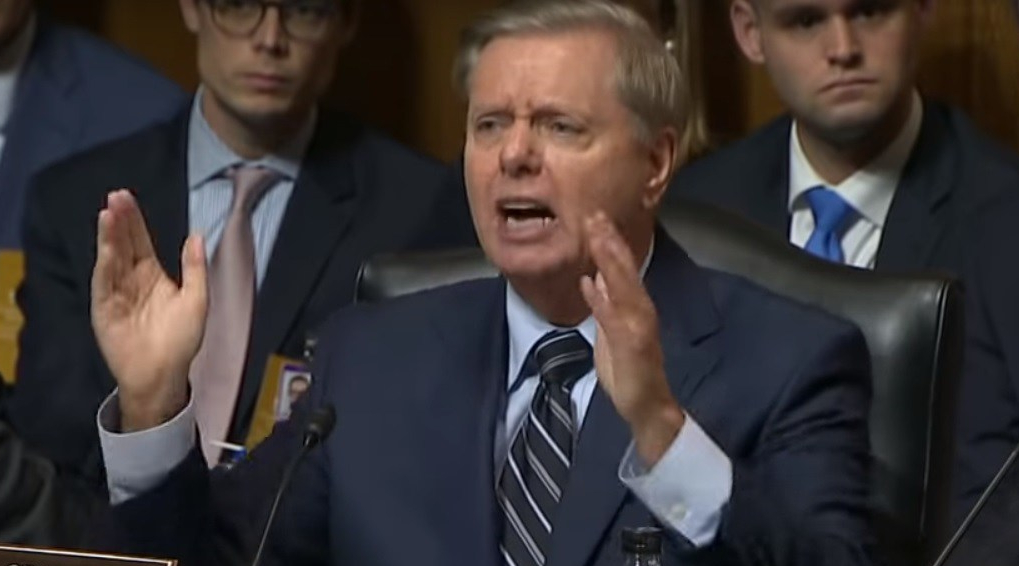Tuesday, November 6th is election day. Millions of Americans will head to the polls. Millions of other Americans will ignore the election and not bother voting. Both groups have the right to vote or not vote. But only those who vote will be fulfilling their civic responsibility.
I teach the US citizenship test to refugees. The test has 100 questions. The testing officer could ask up to 10 questions and the applicant has to get 6 correct. Question 50 asks, “Name one right only for United States citizens.” One of the correct answers is “vote in a federal election.” Question 49 asks, “What is one responsibility that is only for United States citizens?” And one correct answer is “vote in a federal election.”
We could make a simple Venn diagram of things that are both rights and responsibilities, and voting would be smack in the middle of it. There are not many things that are both a right and a responsibility. Serving on a jury is a responsibility, but it’s not a right. Owning a gun is a right in America, but it’s definitely not a responsibility, even though the NRA and its cheerleaders disgustingly try to tell us it is after every mass shooting.
The Second Amendment implies the right to not own a gun. The First Amendment’s freedom of religion guarantees the right to observe no religion at all. The right to vote seemingly implies a right to not vote, but not voting is ethically more similar to failing to show up for jury duty than to not going to a church or not buying a gun.
The fact that voting is a right is important. The effort by Republicans to strip hundreds of thousands of American citizens of their registrations and access to polling places is an attack on their rights.
But we shouldn’t think of it strictly as a right. Liberalism in America has lost sight of its emphasis on democracy’s duties, obligations, responsibilities. President John F. Kennedy called the nation to civic duty in his inaugural address with the call to “ask not what your country can do for you, ask what you can do for your country.” This may be taking it a bit far. A healthy social contract requires mutual investment between the people and their government. But his point is true: we need to think about what we can do for our country. And voting is one of the most important duties we have as citizens.
Writing about the national debt, Thomas Jefferson said, “For a nation as a Society, forms a moral person, and every member of it is personally responsible for his Society.” This idea is at least as old as Plato’s “Republic,” which thinks of a good society in terms of the best way to educate an individual.
Jefferson’s ideas were born in the Enlightenment. The greatest thinker of Enlightenment ethics was Immanuel Kant. Kant’s categorical imperative, sort of the golden rule for grown-ups, states that you should always act in a way that it would make sense for everyone to act. It might seem okay to run a red light once in a while when no one is looking. But if everyone always did that, the whole traffic system would collapse and people would die.
Similarly, it’s easy to think that your one vote doesn’t matter. But if everyone decided not to vote, then not-voting becomes the deciding factor in an election. And something other than democracy would decide how the country is ruled.
In 2016, only 55% of eligible voters participated. In 2014, only 34% voted. THIRTY-FOUR PERCENT. That’s a third of all voters. Two-thirds of Americans sat out that election. The highest turnout election in recent history was 2008, when 58% of voters showed up. That’s still 42% who didn’t bother. The last time 60% or more of voters turned up was in the 1960s. We have been lucky for a long time that there were no truly bad faith actors who exploited that void of legitimacy in our democratic system. But our luck in that regard started to run out in 2016.
As a whole, America is failing to fulfill its responsibility to vote. And each individual who doesn’t vote shares his or her moral responsibility for that mass failure. Even though Republicans are doing their best to make it hard to vote, the number of people who don’t bother to vote is the biggest threat to democracy.
Our media culture has conditioned us to think of our democracy as an interminable pageant of horse-race analysis. It’s easy to tune that out. And millions of Americans have.
But the two-year election cycle is the wrong prism through which to view democracy. Achieving and maintaining a democracy is extremely rare. There have only been three significant expansions of democracy in world history.
In the ancient world, the Greek city states invented democracy. Their run of democracy lasted under 200 years, shorter than the history of the United States. And during that time period, probably under 100,000 people lived under democracy at a given time. Meanwhile, the Greeks were warring with the decidedly undemocratic Persian empire, which had a population of around 100 million. So, even though the ancient Greeks passed down a remarkable cultural heritage to the world, it’s important to remember that it was far from a normal experience to live under democratic rule in the ancient world.
In the modern world, the Enlightenment sparked a series of revolutions that began with the bloody birth of America in 1776 and continued for nearly a century as monarchies crumbled around the world.
In the 20th Century, democracy contracted with the rise of communist and fascist dictatorships. After World War II, some liberated peoples were restored to democracy, while others languished under the Soviet Union or new forms of military junta for the next half century.
The fall of the Soviet Union was the last great expansion of democracy, which saw the former Soviet satellites rush toward integration with the West. And it is only in the past few decades that a majority of people in the world have lived under something resembling democratic rule.
In the 60,000 years or so since homo sapiens began leaving Africa and building complex settlements, there has probably been less than 500 years during which there was a broadly organized, highly functioning democracy somewhere on earth. And even during those times, the vast majority of people didn’t live in a democracy.
In the grand sweep of history, most societies have been organized around clans or tribes. Most social contracts have been openly hierarchical and unjust. Most political paradigms were of warring states and rising and falling empires. Most human beings who have ever lived were lucky if they lived in a time of relative stability, wherein a warlord provided protection in return for menial labor and unquestioning loyalty. Hundreds of millions of people even in the 20th Century died grisly deaths because they were even less lucky than that. That our democracy exists at all and that we happen to live in it makes us among the most profoundly fortunate people who have ever lived.
Democracy is now under siege around the word. Countries as disparate as Venezuela, Turkey, Hungary, Poland, Brazil, the United States, are experiencing an insurgence of oligarchy and strongman demagoguery chipping away at the foundations and safeguards of democratic society.
It used to be an article of faith that democracy would eventually and inevitably inspire one-party states like Russia and China to open up as more of their people experienced globalism. Recent events have actually shown the opposite. Authoritarian states are closing down more, and serve as inspiration for anti-globalist, anti-democratic, anti-immigrant parties in longstanding democracies.
Democracy is something that can never be taken for granted. And yet, when we fail to vote, that is exactly what we are doing. It is my fervent hope that recent elections, and the right wing erosion of the right to vote, has taught the American people that we are never more than one election away from potentially losing our right to vote forever. When we don’t vote, people who don’t want us to vote get into power. Once anti-democratic forces gain power, even in a democracy, history shows us it can be very hard to get them out.
In America, we are straddling the razor’s edge of grand historical change. We will either pull back our democracy from the brink of authoritarianism, or our apathy will allow anti-democratic forces to slice us into pieces and slide American society into the garbage disposal of history.
America is profoundly lucky that we have had a deeply flawed yet very real democratic social contract for 242 years. You would be very hard-pressed to find another run of democracy that long anywhere else at any time in human history.
The people who authored the Constitution were skeptical that it would last long. Asked what kind of government the Founders were creating, Benjamin Franklin replied, “A Republic, if you can keep it.”
Since the Constitution was ratified in 1788 every election has featured input from some part of the population, and some form of peaceful transfer of power (yes, you can find exceptions, but they prove the rule). Throughout human history, most transfers of power in non-democratic societies are bloody and terrifying, and are ultimately decided by a small cabal of the powerful for their own private interests.
Every single election is a passing of the torch, not to some abstract unknowable future, but only until the very next election. Failing to vote is dropping the torch that has been handed off since the American Revolution. Failing to vote is saying that you don’t need to have the right to give your input in how society is run. Failing to vote is saying that you’re okay with a bloody power struggle. Failing to vote is saying that it’s okay if a small cabal of those who monopolize military, financial and media power decide who rules and how. Failing to vote is saying that it’s okay if you and everyone who comes after you lives in a dictatorship.
Despite the wreckage of the 2016 election, there is still a lit, but sputtering torch being passed to you. You have not only a right, but a responsibility to pick up that torch on Tuesday, and pass it on until the 2020 election. If you don’t hand it off, it might not be there at all next time. And then the flames coming for you won’t be a torch.
No matter how hard it is to vote on Tuesday, no matter how long the line is, no matter what ID they ask you for, do whatever you have to in order to vote. If they try to deny you, ask for a provisional ballot. They cannot legally refuse you a provisional ballot. If anyone does anything to attempt to deny you your right to vote, including unreasonably long lines, contact the ACLU.
It’s no accident that our national anthem ends on a question. Every election we have to decide whether our flag still waves over the land of the free, or if it waves over something else. No generation of Americans since the Civil War have been faced with that question in a more fundamental way than we are. On Tuesday, please fulfill your responsibility, and answer that question with a resounding yes.
Vote.
Featured image via Mrs. Gemstone/Flickr




